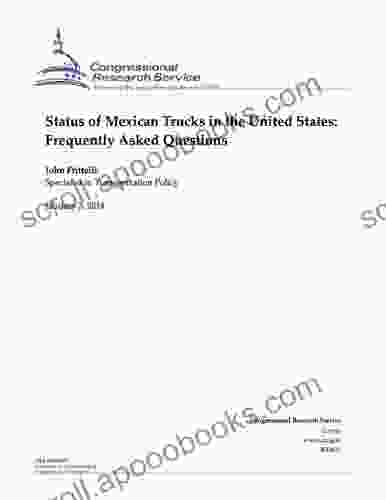The Complete Guide to the Status of Mexican Trucks in the United States

The relationship between the United States and Mexico is complex and multifaceted, and one of the most contentious issues in recent years has been the status of Mexican trucks in the United States. This issue has been the subject of numerous negotiations, lawsuits, and protests, and it remains a major source of tension between the two countries.
This guide will provide a comprehensive overview of the current status of Mexican trucks in the United States, covering regulations, safety concerns, and economic impact. We will also discuss the history of the issue and the potential future of Mexican trucks in the United States.
Mexican trucks are subject to a number of regulations in the United States, including:
4.8 out of 5
| Language | : | English |
| File size | : | 351 KB |
| Text-to-Speech | : | Enabled |
| Screen Reader | : | Supported |
| Enhanced typesetting | : | Enabled |
| Word Wise | : | Enabled |
| Print length | : | 12 pages |
| Lending | : | Enabled |
- Safety regulations: Mexican trucks must meet the same safety standards as U.S. trucks. This includes requirements for brakes, lights, tires, and other safety equipment.
- Driver qualifications: Mexican truck drivers must be licensed and qualified to drive in the United States. This includes meeting requirements for age, experience, and training.
- Insurance: Mexican trucks must be insured in the United States. This insurance must meet the same requirements as insurance for U.S. trucks.
- Routing: Mexican trucks are only allowed to travel on certain designated routes in the United States. These routes are typically limited to major highways and bFree Download crossings.
These regulations are enforced by the Federal Motor Carrier Safety Administration (FMCSA). The FMCSA can inspect Mexican trucks at any time and can issue citations or fines for violations of safety regulations.
There are a number of safety concerns associated with Mexican trucks in the United States. These concerns include:
- Driver fatigue: Mexican truck drivers often drive long hours, which can lead to fatigue and accidents.
- Vehicle maintenance: Mexican trucks are often not as well-maintained as U.S. trucks, which can increase the risk of accidents.
- Language barriers: Mexican truck drivers may not be fluent in English, which can make it difficult for them to communicate with law enforcement officers and other drivers.
These safety concerns have led to a number of restrictions on Mexican trucks in the United States. For example, Mexican trucks are not allowed to travel on certain highways or during certain hours of the day.
The presence of Mexican trucks in the United States has a significant economic impact. Mexican trucks are often used to transport goods between the United States and Mexico, and they are also used to transport goods within the United States. This competition has led to lower prices for consumers and businesses.
However, the presence of Mexican trucks has also had some negative economic impacts. For example, Mexican trucks have been blamed for job losses in the U.S. trucking industry. Additionally, Mexican trucks have been accused of contributing to traffic congestion and pollution.
The issue of Mexican trucks in the United States has a long and complex history. In 1982, the United States and Mexico signed an agreement that allowed Mexican trucks to operate in the United States on a temporary basis. This agreement was renewed several times, but it was never made permanent.
In 2007, the United States Congress passed a law that would have allowed Mexican trucks to operate freely in the United States. However, this law was vetoed by President George W. Bush.
In 2009, the United States and Mexico signed a new agreement that allowed Mexican trucks to operate in the United States on a pilot basis. This agreement was renewed in 2011 and 2013.
In 2015, the FMCSA issued a final rule that allowed Mexican trucks to operate freely in the United States. However, this rule was challenged in court, and it was ultimately overturned.
The future of Mexican trucks in the United States is uncertain. The FMCSA is currently working on a new rule that would allow Mexican trucks to operate freely in the United States. However, it is unclear when this rule will be finalized.
Additionally, there are a number of political factors that could affect the future of Mexican trucks in the United States. For example, the election of Donald Trump as president has raised concerns about the future of trade between the United States and Mexico.
The issue of Mexican trucks in the United States is a complex one with a long and contentious history. There are a number of regulations, safety concerns, and economic impacts associated with Mexican trucks in the United States. The future of Mexican trucks in the United States is uncertain, but it is clear that this issue will continue to be a source of tension between the United States and Mexico.
4.8 out of 5
| Language | : | English |
| File size | : | 351 KB |
| Text-to-Speech | : | Enabled |
| Screen Reader | : | Supported |
| Enhanced typesetting | : | Enabled |
| Word Wise | : | Enabled |
| Print length | : | 12 pages |
| Lending | : | Enabled |
Do you want to contribute by writing guest posts on this blog?
Please contact us and send us a resume of previous articles that you have written.
 Book
Book Novel
Novel Page
Page Chapter
Chapter Text
Text Story
Story Genre
Genre Reader
Reader Library
Library Paperback
Paperback E-book
E-book Magazine
Magazine Newspaper
Newspaper Paragraph
Paragraph Sentence
Sentence Bookmark
Bookmark Shelf
Shelf Glossary
Glossary Bibliography
Bibliography Foreword
Foreword Preface
Preface Synopsis
Synopsis Annotation
Annotation Footnote
Footnote Manuscript
Manuscript Scroll
Scroll Codex
Codex Tome
Tome Bestseller
Bestseller Classics
Classics Library card
Library card Narrative
Narrative Biography
Biography Autobiography
Autobiography Memoir
Memoir Reference
Reference Encyclopedia
Encyclopedia Wendy Gorton
Wendy Gorton Brian W Smith
Brian W Smith Stevie Bowen
Stevie Bowen Timothy Dodge
Timothy Dodge Bobbie Faulkner
Bobbie Faulkner Julie Chimes
Julie Chimes Brock Clarke
Brock Clarke Deborah Lynn Porter
Deborah Lynn Porter Jay F Hemdal
Jay F Hemdal Stephanie Thornton
Stephanie Thornton Brainchimp
Brainchimp Beverly Falk
Beverly Falk Bright Summaries
Bright Summaries Svetlana Quindt
Svetlana Quindt Bill Sharpsteen
Bill Sharpsteen Glenn Reschke
Glenn Reschke Ethan Blue
Ethan Blue Holly Sheidenberger
Holly Sheidenberger Brad M Currie
Brad M Currie Leo Tolstoy
Leo Tolstoy
Light bulbAdvertise smarter! Our strategic ad space ensures maximum exposure. Reserve your spot today!

 Ian MitchellUnlock Early Literacy with Early Decodable Simple Words Early Decodable Books
Ian MitchellUnlock Early Literacy with Early Decodable Simple Words Early Decodable Books
 Thomas PynchonQuilting for Easter: A Beginners' Guide to Creating Beautiful and Meaningful...
Thomas PynchonQuilting for Easter: A Beginners' Guide to Creating Beautiful and Meaningful... Felipe BlairFollow ·9.9k
Felipe BlairFollow ·9.9k Jack PowellFollow ·14k
Jack PowellFollow ·14k Henry David ThoreauFollow ·10.1k
Henry David ThoreauFollow ·10.1k Harold BlairFollow ·7.8k
Harold BlairFollow ·7.8k Cason CoxFollow ·15.7k
Cason CoxFollow ·15.7k Ronald SimmonsFollow ·2.2k
Ronald SimmonsFollow ·2.2k Bill GrantFollow ·6.1k
Bill GrantFollow ·6.1k Ryan FosterFollow ·2.1k
Ryan FosterFollow ·2.1k

 Corey Green
Corey GreenHuman Geography: A Concise Introduction by Gilbert...
A Journey into the Dynamic Realm of...

 Julian Powell
Julian PowellTrain Your Mind to Make Great Art a Habit
Do you dream of...

 Matthew Ward
Matthew WardSmall Town Romance: Heart Compass
Escape to Willow Creek, Where...

 Neil Parker
Neil ParkerMusic, Social Media, and Global Mobility: Exploring...
: The Convergence of Music, Media, and...

 Seth Hayes
Seth HayesUnlock the Potential of Potential Theory with Brooke...
Embark on an...
4.8 out of 5
| Language | : | English |
| File size | : | 351 KB |
| Text-to-Speech | : | Enabled |
| Screen Reader | : | Supported |
| Enhanced typesetting | : | Enabled |
| Word Wise | : | Enabled |
| Print length | : | 12 pages |
| Lending | : | Enabled |










